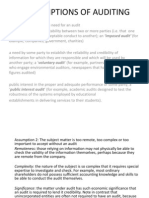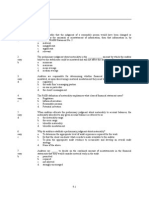Chapter 6 Quiz Key
Chapter 6 Quiz Key
Uploaded by
mar8357Copyright:
Available Formats
Chapter 6 Quiz Key
Chapter 6 Quiz Key
Uploaded by
mar8357Original Description:
Copyright
Available Formats
Share this document
Did you find this document useful?
Is this content inappropriate?
Copyright:
Available Formats
Chapter 6 Quiz Key
Chapter 6 Quiz Key
Uploaded by
mar8357Copyright:
Available Formats
Chapter 6 Quiz Name: 1. a. b. c. d. 2. a. b. c. d. !. a. b. c. d.
The objective of the ordinary audit of financial statements is the expression of an opinion on: the fairness of the financial statements. the accuracy of the financial statements. the accuracy of the annual report. the balance sheet and income statement. If management insists on financial statement disclosures that the auditor finds unacceptable, the auditor can: issue an adverse audit report. issue a qualified audit report. ithdra from the engagement. choose any of these three courses of action. "hich of the follo ing is not one of the reasons that auditors provide only reasonable assurance on the financial statements# The auditor commonly examines a sample, rather than the entire population of transactions. $ccounting presentations contain complex estimates hich involve uncertainty. %raudulently prepared financial statements are often difficult to detect. $uditors believe that reasonable assurance is sufficient in the vast majority of cases. If a short'term note payable is included in the accounts payable balance on the financial statement, there is a violation of the: completeness assertion. existence assertion. cutoff assertion. classification and understandability assertion. %raudulent financial reporting is most li)ely to be committed by hom# *ine employees of the company. +utside members of the company,s board of directors. -ompany management. The company,s auditors.
&. a. b. c. d. (. a. b. c. d.
.. a. b. c. d. /. a. b. c. d. 1. a. b. c. d. 3. a. b. c. d.
The auditor has considerable responsibility for notifying users as to hether or not the statements are properly stated. This imposes upon the auditor a duty to: provide reasonable assurance that material misstatements ill be detected. be a guarantor of the fairness in the statements. be equally responsible ith management for the preparation of the financial statements. be an insurer of the fairness in the statements. "hich of the follo ing statements is true# It is usually easier for the auditor to uncover frauds than errors. It is usually easier for the auditor to uncover errors than frauds. It is usually equally difficult for the auditor to uncover errors or frauds. 0sually, none of the above statements is true. If several employees collude to falsify documents, the chance a normal audit ould uncover such acts is: very lo . very high. 2ero. none of the above. The most important general ledger account included in and affecting several cycles is the: cash account. inventory account. income tax expense and liability accounts. retained earnings account.
14. 5anagement assertions are: a. implied or expressed representations about accounts, transactions, and disclosures in the financial statements. b. stated in the footnotes to the financial statements. c. explicitly expressed representations about the financial statements. d. provided to the auditor in the assertions letter, but are not disclosed on the financial statements. 11. 6riefly explain each management assertion related to classes of transactions and events for the period under audit. $ns er: Occurrence. Transactions and events that have been recorded have
occurred and pertain to the entity. Completeness. $ll transactions and events that should have been recorded have been recorded. Accuracy. $mounts and other data relating to recorded transactions and events have been recorded appropriately. Classification. Transactions and events have been recorded in the proper accounts. Cutoff. Transactions and events have been recorded in the correct accounting period. 7iscuss three reasons hy auditors are responsible for 8reasonable9 but not 8absolute9 assurance.
12.
$ns er: 5ost audit evidence results from testing a sample of a population. :ampling involves some ris) of not uncovering material misstatements. $ccounting presentations contain complex estimates, hich inherently involve uncertainty and can be affected by future events. $s a result, the auditor has to rely on evidence that is persuasive but not convincing. %raudulently prepared financial statements are often very difficult for the auditor to detect, especially hen there is collusion among management.
You might also like
- Avon S CaseDocument4 pagesAvon S CaseReign EvansNo ratings yet
- Audit Objectives, Evidences and Techniques - 50 PagesDocument53 pagesAudit Objectives, Evidences and Techniques - 50 PagesPam G.100% (2)
- Tilenga Rap1 Executive SummaryDocument24 pagesTilenga Rap1 Executive SummaryTotal EP Uganda100% (2)
- 19Document9 pages19jhouvanNo ratings yet
- Subledger Accounting in Oracle EBS R12Document15 pagesSubledger Accounting in Oracle EBS R12Amine GallahNo ratings yet
- Module 5 - Audit Process, Accepting An EngagementDocument9 pagesModule 5 - Audit Process, Accepting An EngagementMAG MAGNo ratings yet
- Chapter 13 Audit of Long LiDocument37 pagesChapter 13 Audit of Long LiKaren Balibalos100% (1)
- EDP Auditing SemiFinalDocument4 pagesEDP Auditing SemiFinalErwin Labayog MedinaNo ratings yet
- Pre EngagementDocument2 pagesPre EngagementCM LanceNo ratings yet
- Practice Questions For Audit TheoryDocument4 pagesPractice Questions For Audit TheoryHanna Lyn BaliscoNo ratings yet
- Quiz-Pre Engagement & Audit PlanningDocument5 pagesQuiz-Pre Engagement & Audit PlanningVergel MartinezNo ratings yet
- Chapter 10 Test BankDocument48 pagesChapter 10 Test BankDAN NGUYEN THE100% (1)
- At MCQ Salogsacol Auditing Theory Multiple ChoiceDocument32 pagesAt MCQ Salogsacol Auditing Theory Multiple ChoiceJannaviel MirandillaNo ratings yet
- Inventories and COGSDocument30 pagesInventories and COGSJekNo ratings yet
- At 05 Preliminary Engagement Activities PDFDocument4 pagesAt 05 Preliminary Engagement Activities PDFMadelyn Jane IgnacioNo ratings yet
- Logo Here Auditing Theory Philippine Accountancy Act of 2004Document35 pagesLogo Here Auditing Theory Philippine Accountancy Act of 2004KathleenCusipagNo ratings yet
- Unit 1 - Fundamentals of Auditing and Assurance ServicesDocument20 pagesUnit 1 - Fundamentals of Auditing and Assurance ServicesJalieha MahmodNo ratings yet
- Chapter 7 AIS James HallDocument45 pagesChapter 7 AIS James Hallheyhey100% (1)
- Assumptions of AuditingDocument8 pagesAssumptions of Auditinggandhunk0% (1)
- CHAPTER 12 - RR REVENUES From Contracts With Customers: Jan 02, 20x5Document13 pagesCHAPTER 12 - RR REVENUES From Contracts With Customers: Jan 02, 20x5Jane DizonNo ratings yet
- Audit Documentation Test BankDocument1 pageAudit Documentation Test BankJadeNo ratings yet
- Department of Accountancy: Page - 1Document5 pagesDepartment of Accountancy: Page - 1NoroNo ratings yet
- Instruction: Show Your Solution. No Solution Incorrect AnswerDocument1 pageInstruction: Show Your Solution. No Solution Incorrect AnswerRian ChiseiNo ratings yet
- Investments in Financial Instruments CompleteDocument34 pagesInvestments in Financial Instruments CompleteDenise CruzNo ratings yet
- Answer Key-NbasDocument4 pagesAnswer Key-NbasJelyn SolitoNo ratings yet
- Ra 9298Document14 pagesRa 9298Errah Jenn CajesNo ratings yet
- Coursehero 6Document2 pagesCoursehero 6nhbNo ratings yet
- Module 1 - Fundamental Principles of Assurance EngagementsDocument10 pagesModule 1 - Fundamental Principles of Assurance EngagementsLysss EpssssNo ratings yet
- CH 08Document22 pagesCH 08xxxxxxxxxNo ratings yet
- C. Appropriate Professional FeeDocument1 pageC. Appropriate Professional Feeelsana philipNo ratings yet
- AUD THEO BSA 51 Mr. LIMHEYADocument137 pagesAUD THEO BSA 51 Mr. LIMHEYAMarie AzaresNo ratings yet
- AACA Inventory Test BankDocument8 pagesAACA Inventory Test BankLiberty NovaNo ratings yet
- Chapter 6 QuizDocument8 pagesChapter 6 QuizWael AyariNo ratings yet
- PSA 220 Quality Control For Historical Info SummaryDocument6 pagesPSA 220 Quality Control For Historical Info SummaryAbraham ChinNo ratings yet
- Auditing Multiple ChoicesDocument8 pagesAuditing Multiple ChoicesyzaNo ratings yet
- IAT 2020 Final Preboard (Source SimEx4 RS)Document15 pagesIAT 2020 Final Preboard (Source SimEx4 RS)Mary Yvonne AresNo ratings yet
- Practice Final PB AuditingDocument14 pagesPractice Final PB AuditingBenedict BoacNo ratings yet
- Auditing The Revenue Receipt Cycle QuizDocument2 pagesAuditing The Revenue Receipt Cycle Quizgaler Ledesma100% (1)
- 3 4Document5 pages3 4RenNo ratings yet
- Assignment in Error Fraud Non Compliance..Document5 pagesAssignment in Error Fraud Non Compliance..7y8t7hshfwNo ratings yet
- The Professional StandardsDocument1 pageThe Professional StandardsPau SantosNo ratings yet
- AUD Final Preboard Examination QuestionnaireDocument16 pagesAUD Final Preboard Examination QuestionnaireJoris YapNo ratings yet
- Auditors' Reports: True / False QuestionsDocument13 pagesAuditors' Reports: True / False QuestionsLime MNo ratings yet
- CIS Chapter 1Document2 pagesCIS Chapter 1Michelle AnnNo ratings yet
- Auditing, Attestation, and AssuranceDocument3 pagesAuditing, Attestation, and AssuranceChryzbryth LorenzoNo ratings yet
- P2 - Installment Sales, O2018 AUFDocument5 pagesP2 - Installment Sales, O2018 AUFedsNo ratings yet
- AFAR-02 Corporate LiquidationDocument2 pagesAFAR-02 Corporate LiquidationRamainne RonquilloNo ratings yet
- 310-Psa 310Document13 pages310-Psa 310Andreiu Mark Salvador EsmeleNo ratings yet
- Chapter 16 Solution ManualDocument22 pagesChapter 16 Solution ManualTri MahathirNo ratings yet
- PracticeDocument6 pagesPracticeAnna Parcia100% (1)
- Group 2 - A-533 - Case No. 9 - Brew Bottle CompanyDocument11 pagesGroup 2 - A-533 - Case No. 9 - Brew Bottle CompanyArvey Peña DimacaliNo ratings yet
- AuditingDocument9 pagesAuditingRenNo ratings yet
- Chapter 7 QuizDocument2 pagesChapter 7 QuizliviaNo ratings yet
- AudTheo Reporting Chapter 3Document58 pagesAudTheo Reporting Chapter 3Tuya Dayom100% (1)
- Chapter 5 Audit PlanningDocument6 pagesChapter 5 Audit Planning威陈100% (1)
- Auditing Theory 250 Questions 2 With Answers 1Document40 pagesAuditing Theory 250 Questions 2 With Answers 1Hafsha MangandogNo ratings yet
- Auditor's Cup Questions-2Document8 pagesAuditor's Cup Questions-2francesNo ratings yet
- CHAPTER 2 Auditing Business Process Outsourcing IndustryDocument6 pagesCHAPTER 2 Auditing Business Process Outsourcing IndustryNanase SenpaiNo ratings yet
- CERTS - Revenue CycleDocument8 pagesCERTS - Revenue CycleralphalonzoNo ratings yet
- Multiple-Choice QuestionsDocument21 pagesMultiple-Choice Questionssparts23No ratings yet
- Chapter 10 Solman Aud TheoDocument8 pagesChapter 10 Solman Aud TheoRomulus AronNo ratings yet
- Arens Auditing and Assurance Services 13eDocument9 pagesArens Auditing and Assurance Services 13eintanfidztiraNo ratings yet
- Chapter9 - FinalDocument17 pagesChapter9 - FinalbraveusmanNo ratings yet
- Chapter 10Document35 pagesChapter 10mar8357No ratings yet
- ch14 Test Bank KiesoDocument44 pagesch14 Test Bank KiesoBukhori IsroNo ratings yet
- CH 13Document76 pagesCH 131asdfghjkl3No ratings yet
- 17e 2Document3 pages17e 2Carson McKnightNo ratings yet
- Chapter 11 Audit Reports On Financial StatementsDocument54 pagesChapter 11 Audit Reports On Financial StatementsKayla Sophia PatioNo ratings yet
- Accounting, 21st EditionDocument56 pagesAccounting, 21st EditionwarsimaNo ratings yet
- AnnualReport - 09-10 MRF TYREDocument88 pagesAnnualReport - 09-10 MRF TYRESanjay ChauhanNo ratings yet
- A Comparative Study On Financial Performance of Sbi and HDFC BankDocument7 pagesA Comparative Study On Financial Performance of Sbi and HDFC BankBhumika MittapelliNo ratings yet
- 1st Quarter DiscussionDocument10 pages1st Quarter DiscussionCHARVIE KYLE RAMIREZNo ratings yet
- Atdp Es 000098 - Estimate ClassesDocument10 pagesAtdp Es 000098 - Estimate Classesjonodo89No ratings yet
- International Accounting Standards and Their Influence On The Management of A CompanyDocument9 pagesInternational Accounting Standards and Their Influence On The Management of A Companyanasip_180No ratings yet
- Arun Mishra - Accounting & TaxationDocument80 pagesArun Mishra - Accounting & TaxationSami Zama0% (1)
- Tax Audit915200Document64 pagesTax Audit915200NehaNo ratings yet
- 004 Problems in Foundations of AccountingDocument39 pages004 Problems in Foundations of AccountingsubratcoolNo ratings yet
- Accounting and Finance Set 2Document6 pagesAccounting and Finance Set 2Folegwe FolegweNo ratings yet
- Balancesheet of Mukund CompanyDocument5 pagesBalancesheet of Mukund CompanyHusen AliNo ratings yet
- Acc461 Syllabus Updated - ReidenbachDocument10 pagesAcc461 Syllabus Updated - ReidenbachMatthew ReidenbachNo ratings yet
- Sharia Governance in Islamic BanksDocument14 pagesSharia Governance in Islamic BanksLynaNo ratings yet
- Airplane NotesDocument1 pageAirplane NotesEmma Mariz GarciaNo ratings yet
- COA Strategic Plan 2023-2029 With Annex ADocument16 pagesCOA Strategic Plan 2023-2029 With Annex AjennykidNo ratings yet
- Preparations For IATF Stage-1Document8 pagesPreparations For IATF Stage-1Ravi javaliNo ratings yet
- CV - Ajibola Olawale FADEYI (SID NEW)Document7 pagesCV - Ajibola Olawale FADEYI (SID NEW)Samuel AjibolaNo ratings yet
- Joint Reso Basketball VolleyballDocument3 pagesJoint Reso Basketball VolleyballPau SantosNo ratings yet
- CA Inter Four Plus Two Test Series Unscheduled Sep 2024 1720431927Document9 pagesCA Inter Four Plus Two Test Series Unscheduled Sep 2024 1720431927Vasanth KumarNo ratings yet
- Chapter 1Document49 pagesChapter 1Sami JattNo ratings yet
- Icwa Certificate Course GSTDocument13 pagesIcwa Certificate Course GSTsarvjeet_kaushalNo ratings yet
- Bcom Part 2 AUDITINGDocument4 pagesBcom Part 2 AUDITINGMaham AfzalNo ratings yet
- CMS Base II - Plan Master and Monetary Transaction ControlDocument56 pagesCMS Base II - Plan Master and Monetary Transaction ControlKrishna KingNo ratings yet
- Comptroller and Auditor General of India: Office Code-Name - JK087-PAG/AG (A&E), J&K and LadhakDocument4 pagesComptroller and Auditor General of India: Office Code-Name - JK087-PAG/AG (A&E), J&K and LadhakRaj KumarNo ratings yet
- Audit 8Document1 pageAudit 8batistillenieNo ratings yet
- Team Jasim - Work StatusDocument6 pagesTeam Jasim - Work Statusnaymun.nasirNo ratings yet





























































































